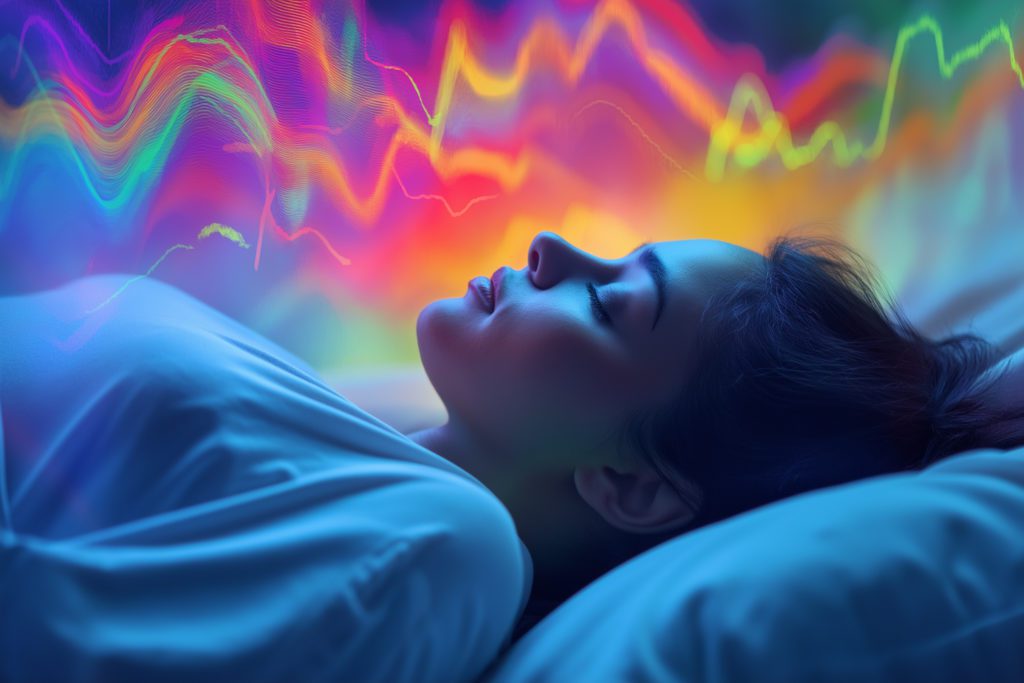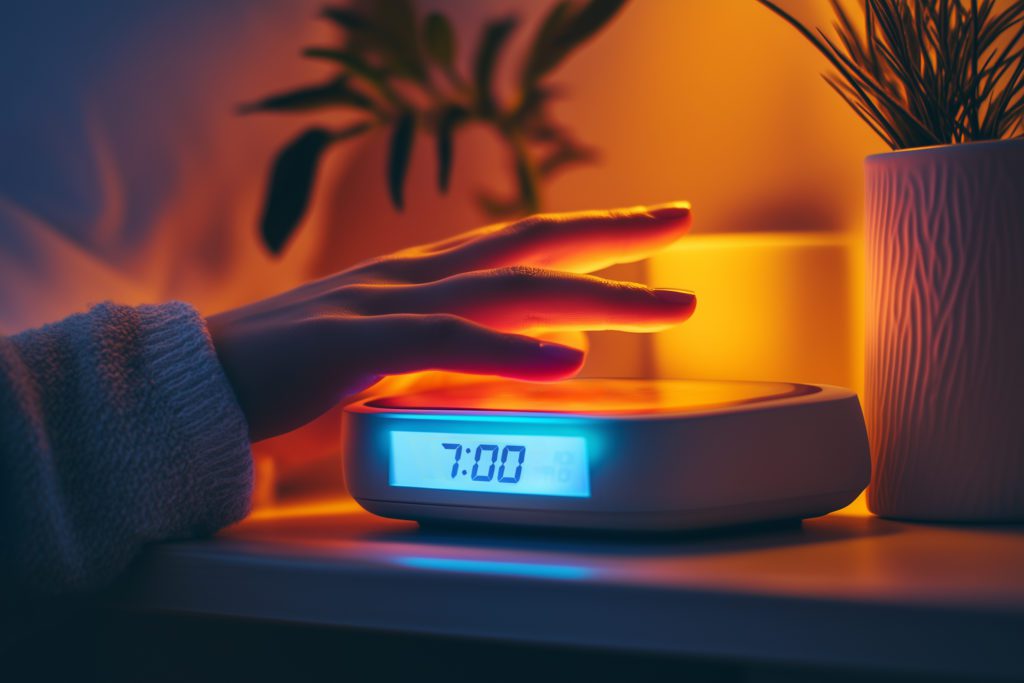
Music and Its Impact on Sleep Architecture
Music can calm your mind, lower stress levels, and offer a dopamine boost. See how these musical traits help you cycle through sleep’s four stages.

Music serves as the soundtrack of life. Whether it’s the tune playing being an emotional scene in a movie or a song that you scream the lyrics to, music has the capability to resonate and connect. Even more, music offers a way to impact your sleep.
Your sleep architecture, or the stages of your night, can be influenced by music, showing the power that chords have in improving your night.
What is Sleep Architecture?
Sleep architecture, similar to the architecture of a building, refers to sleep’s basic structural organization.
Sleep can be divided into two types: non-rapid eye-movement (NREM), which has three stages, and rapid-eye-movement (REM), which makes up the fourth stage of sleep. During the night, our body transitions through these four stages of sleep in a cyclic manner. Each one has a unique set of characteristics, including eye movements (or lack thereof), varying brain wave patterns, and muscle tone.
Our sleep architecture changes as we age, from infancy to adulthood. Some factors that change include how sleep is initiated and maintained, how much time we spend in each stage of sleep, and how efficient sleep is.
However, outside factors can impact our sleep architecture, either favorably or unfavorably.
How Music Impacts Sleep Architecture
Music is a powerful form of art—it can inspire dance, help you focus while studying and working, or offer poignant lyrics that resonate and make you feel less alone in your feelings. Music can also offer benefits at night, especially in regard to its ability to improve your sleep by impacting sleep architecture.
Music Calms
Music has long been known to offer a calming escape, and research has shown how the influence of music affects our sleep architecture, allowing us to sleep better.
One study involving 432 Hz music found that sleep latency decreased in those who listened to music while alpha power increased during sleep. Alpha represents the relaxed state of mind, and its dominance when music is involved showcases music’s calming and relaxing effect on a sleeping brain. As for how this can affect sleep, the greater the alpha power, the less active the brain, and the more restful your sleep. This then leads to greater energy when awake.
Listening to music is also shown to soothe the autonomic nervous system, which is responsible for controlling unconscious processes such as those performed by the heart and lungs. As a result, music can lead to slower breathing, reduced blood pressure, and a lower heart rate, all of which are conducive to an easier time falling and staying asleep, progressing through the sleep stages as intended.
Music Affects Cortisol Production
Music can also influence hormone production in the body, specifically the production of cortisol.
Cortisol, also known as the stress hormone, is present in high amounts when you’re feeling stressed and anxious. It prompts your body’s fight-or-flight response, which drags attention from standard functioning (such as digestion) and instead primes the body to fight or flee. This translates to a faster heart rate and breathing rate.
However, the problem with cortisol is that it can disrupt your sleep if it remains high, which is common in those dealing with chronic stress. Beyond making it hard for you to fall asleep, cortisol can affect your sleep architecture because of its influence on melatonin. Namely, since cortisol and melatonin both use the hypothalamic-pituitary axis (HPA), they can compete with each other—if cortisol is high, melatonin can decrease.
When melatonin levels decline, it can be harder to fall and stay asleep. As a result, those who are stressed are more likely to wake up during the night, disrupting their sleep and sleep architecture. Additionally, research has shown that the longer you are stressed and the higher the corticosterone secretion, the less time you spend in NREM sleep, the third stage of which is also known as deep sleep.
While NREM sleep decreases, daily stress increases REM sleep, which research has suggested may activate signaling pathways in the brain that then lead to mood disorders.
Music Offers A Dopamine Boost
Dopamine, a hormone released during pleasurable activities, sees a boost when listening to music. Not only does this put you in a better headspace when falling asleep and reduces pain—which can otherwise impede sleep—but dopamine plays a critical role in sleep architecture.
Specifically, dopamine is shown to be released during REM sleep, and dopamine depletion has been shown to reduce the total amount of REM sleep. By listening to music and getting its dopamine boost, it may be possible to replenish dopamine levels and restore REM sleep to normal levels.
How to Add Music to Your Sleep Routine
If you’re interested in how music can influence your night and potentially improve your sleep, consider trying out these tips:
- Listen to what you enjoy. There are theories that your heartbeat can sync with the music you listen to, which is why music with 60-80 beats per minute is commonly used in studies. Similarly, music without lyrics is considered less distracting. However, if these types of music do not match the music you enjoy, you’re missing out on the dopamine boost that music can offer, and you may have a hard time sticking with the habit. As such, fill your time with music you enjoy. You could even consider listening to your normal music while preparing for bed and then switching to slower, lyric-less music once you turn the light out for the night.
- Keep it low. The goal of using music at night is to improve your sleep, not blow out your eardrums and increase your odds of a morning headache. So, keep the volume from being too loud.
- Listen to positive music. Music can draw up deep emotions, but that may not be best before bed. Skip the songs that bring up strong negative emotions and instead opt for something neutral or positive before bed.
- Create a solid foundation for your nighttime routine. All habits start from consistency, and seeing the benefits of music will only come if you have a solid evening routine that you follow each night. Be sure to spend time engaging in relaxing activities, keep your sleep environment dark, cool, and quiet, and avoid electronics leading up to bed. When you add music to these good habits, your sleep will improve even more.
By adding music to your sleeping habits, you have an opportunity to see its benefit in your sleep by calming your mind, lowering cortisol levels, and increasing dopamine. This results in a smoother night of sleep with fewer interruptions and higher-quality rest.
FAQ
Does music impact naps the same way it affects nighttime sleep?
Yes, listening to relaxing music before a nap can help you fall asleep faster and improve nap efficiency. However, naps shorter than 30 minutes may not require music, as they don't typically reach deeper sleep stages.
Are there any negative effects of using music for sleep?
For some people, music can become a sleep dependency, meaning they struggle to sleep without it. Additionally, music that evokes strong emotions or memories may keep the mind engaged rather than relaxed.
How does music influence dreaming?
Since music affects REM sleep, which is when most dreaming occurs, it may impact dream intensity or emotional tone. Some people even report hearing music in their dreams when they fall asleep to it.
How does music influence melatonin production?
Music can help lower cortisol levels, which in turn allows melatonin (the sleep hormone) to function properly. Relaxing music can also promote an evening wind-down routine, reinforcing the natural melatonin cycle.
How does music affect sleep in children versus adults?
Music is often more effective for children, as lullabies and soothing sounds can help regulate emotions and establish bedtime routines. In adults, music can still be beneficial but may be influenced by personal preference and stress levels.

Written by
Jessica G
Medical writer freelancer who has written hundreds of articles on varying topics. Masters of Engineering degree in Biomedical Engineering.
Download Pillow
Get help
Press & News
Legal
Connect
X (Twitter)
Company
Copyright © Neybox Digital Ltd.



